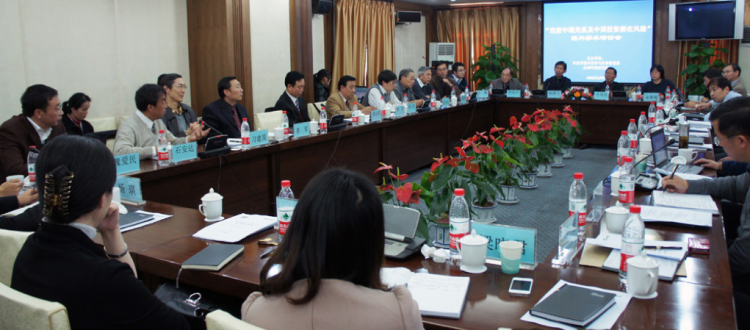Myanmar’s Economic Planners Visit Chinese Economic Development Zones
SHENZHEN (Dec. 14, 2012) – Global Environmental Institute (GEI) and the China Institute of International Studies, co-hosted a delegation from Myanmar comprised of government officials and leaders to visit China’s economic development zones (EDZs) in Dalian, Tianjin and Shenzhen from December 9-14, 2012.
The trip suits the new Myanmar government’s objectives. In fact, since their election in March of 2011, the government of Myanmar has promoted economic reform, developed foreign investment law, and plans to establish three EDZs’ in Kyaukpyu, Di Luowa and Dawei. Representatives from the Myanmar side introduced plans for establishing and actualizing those EDZs during the meeting.

The delegation was comprised of more than ten members, including the Chief Economic Adviser to the President of Myanmar, a member of the National Economic and Social Advisory Board of the President Office, Secretary General of the Chamber of Commerce as well as other individuals who influence economic policy decisions in Myanmar. The delegation also included government officials from the Myanmar National Department for Planning and Economic Development, the Food Safety Commission, the Ministry of Labor as well as experts from the Myanmar Development and Resource Research Institute (MDRI) and other organizations. The former US Chief Mission to Myanmar Pricilla Clapp also participated in all the activities.
This exchange is part of the larger GEI project, the Integrated Policy Package: Environmental and Social Sustainability of China’s Overseas Investments. This project started in 2007 and is directed at improving the environmental performance of Chinese corporations operating abroad and increasing their awareness of sustainability considerations, and at the same time expedite the creation of improved environmental law in host countries.


The event was a huge success as experts from all sides shared their perspective – GEI 2012
Knowledge Sharing on EDZ
During the exchange meeting on “Current opportunities and challenges facing China-Myanmar cooperation” over fifty participants from China and Myanmar discussed the impact of Myanmar economic reform on Myanmar-China and Myanmar-US relations, investment environment and risks in Myanmar and experience in EDZ planning and construction. Representatives from Myanmar expressed their hope to learn more about China’s experience in economic reform and development, especially experience in planning and developing EDZs.
Site Visits
In the following days, GEI representatives and the delegation visited the Da Lian Commodity Exchange (which is the largest agricultural exchange in Asia and the second largest in the world) as well as the Dalian East New Energy Development Company. GEI has worked previously with Dalian East New Energy Development to create an energy service company, which has relied on the energy management contract model and CDM mechanism to successfully bid on the construction of three cement waste heat recovery power generation facilities. The company is still in commercial operation. Dalian East New Energy Development Company and the delegation from Myanmar discussed possibilities for future cooperation as well as for visits to Myanmar.
The delegation visited sites in the new economic and technology development zone in the Tianjin Binhai New Area as well as the newly built eco-city in Tianjin. The Tianjin Eco-city was constructed in a cooperative effort between the governments of Singapore and China, in the hopes of building a livable and environmentally sustainable urban area. After arriving at the Shenzhen Special Economic Zone (SEZ), a former government official with in depth knowledge on the history of the SEZ gave an overview of the development history of the SEZ to the delegation.
The trip exposed the delegation to many advanced concepts and gave them a good introduction to EDZs in China. The delegation learned that the development of EDZs is more than simply acquiring a piece of land and instead requires coordinating a complex set of circumstances, policy, personal and material requirements, including, infrastructure, tax, finance and environmental policy. The delegation from Myanmar was especially concerned with rights for local rural residents in the EDZs, as well as the living accommodation, minimum wage and labor arbitration of those residents.
Chinese Investment Risks in Myanmar
Prior to the exchange, on November 26, GEI and the China Foreign Affairs University held a meeting on “Current China-Myanmar Relations and Potential Risks of Chinese Investment in Myanmar.” Over 30 scholars, industry experts and enterprise representatives discussed political situations in Myanmar, and related Chinese investment risks and appropriate responses. This is the first face-to-face interaction between representatives from China Power Investment (CPI) (the primary investor of the Myitsone dam project) and most meeting participants after the Myanmar Government halted the Myitsone dam project in 2011. All participants expressed their opinions actively, with the meeting extended over an hour longer than expected.
Experts from Yunnan Academy of Social Sciences and Yunnan University have conducted long-term research on issues related to Myanmar. They analyzed issues and challenges related to Myanmar’s political trends, investment environment and ethnic minorities on a macro level. Other participants expressed their views, discussed environmental protection, community participation, etc. of Chinese investment in Myanmar, and suggested relevant parties to change the old way of thinking and improve communication and publicity to avoid future investment risks. CPI and private enterprise representatives overviewed their efforts and difficulties in these areas as well as their related experience and inadequacies.
Participants in the meeting expressed that domestic understanding of Myanmar and related challenges remain limited. Exchanging viewpoints and experience of different actors from different sectors will help facilitate a greater understanding of those issues and improve cooperation in different sectors. GEI program officer Ren Peng gave an overview of GEI’s Environmental Governance Program activities in Myanmar and the key issues found through these activities and highlighted the role of NGOs in promoting communication between enterprises, governments and communities.

